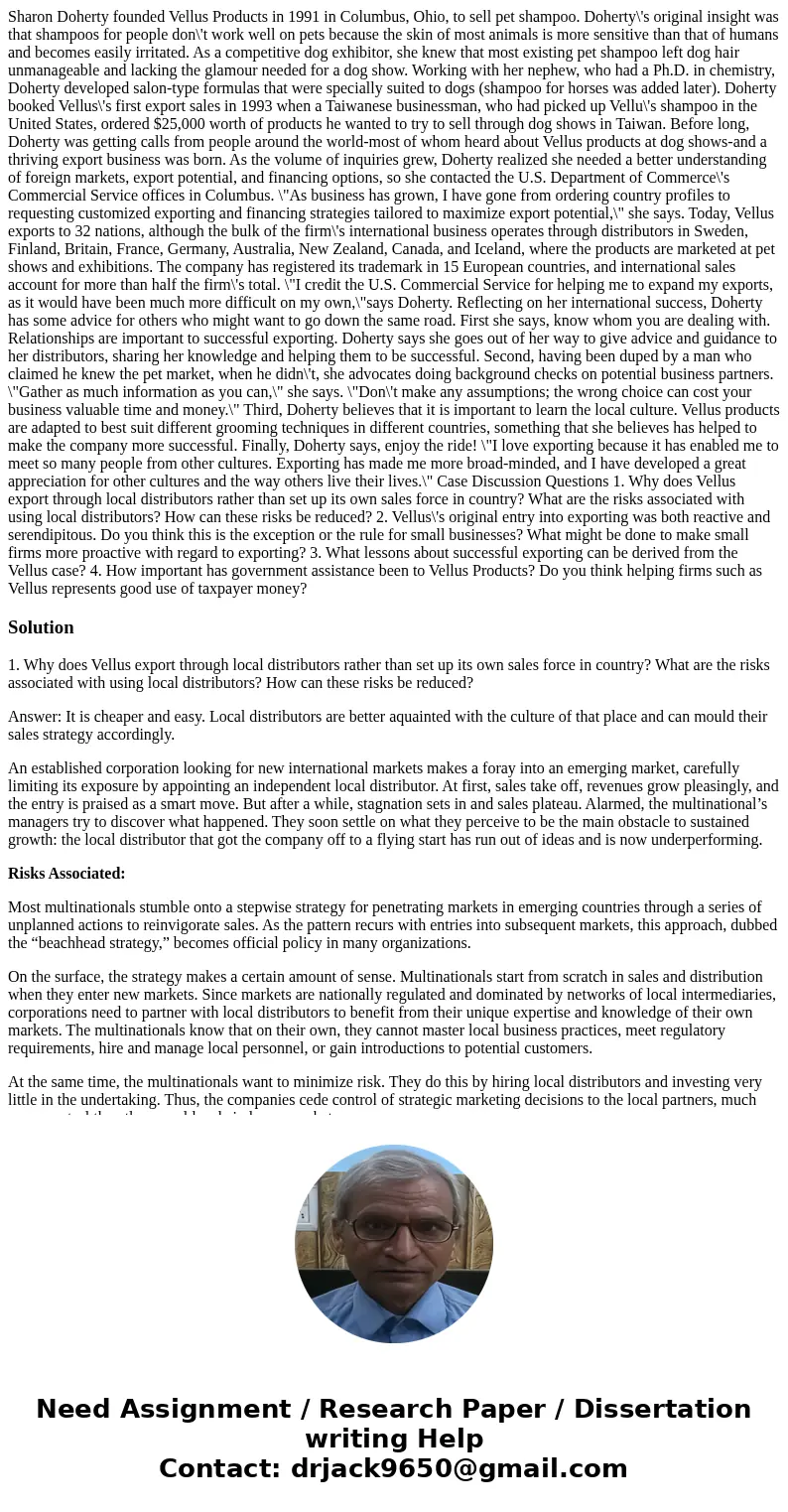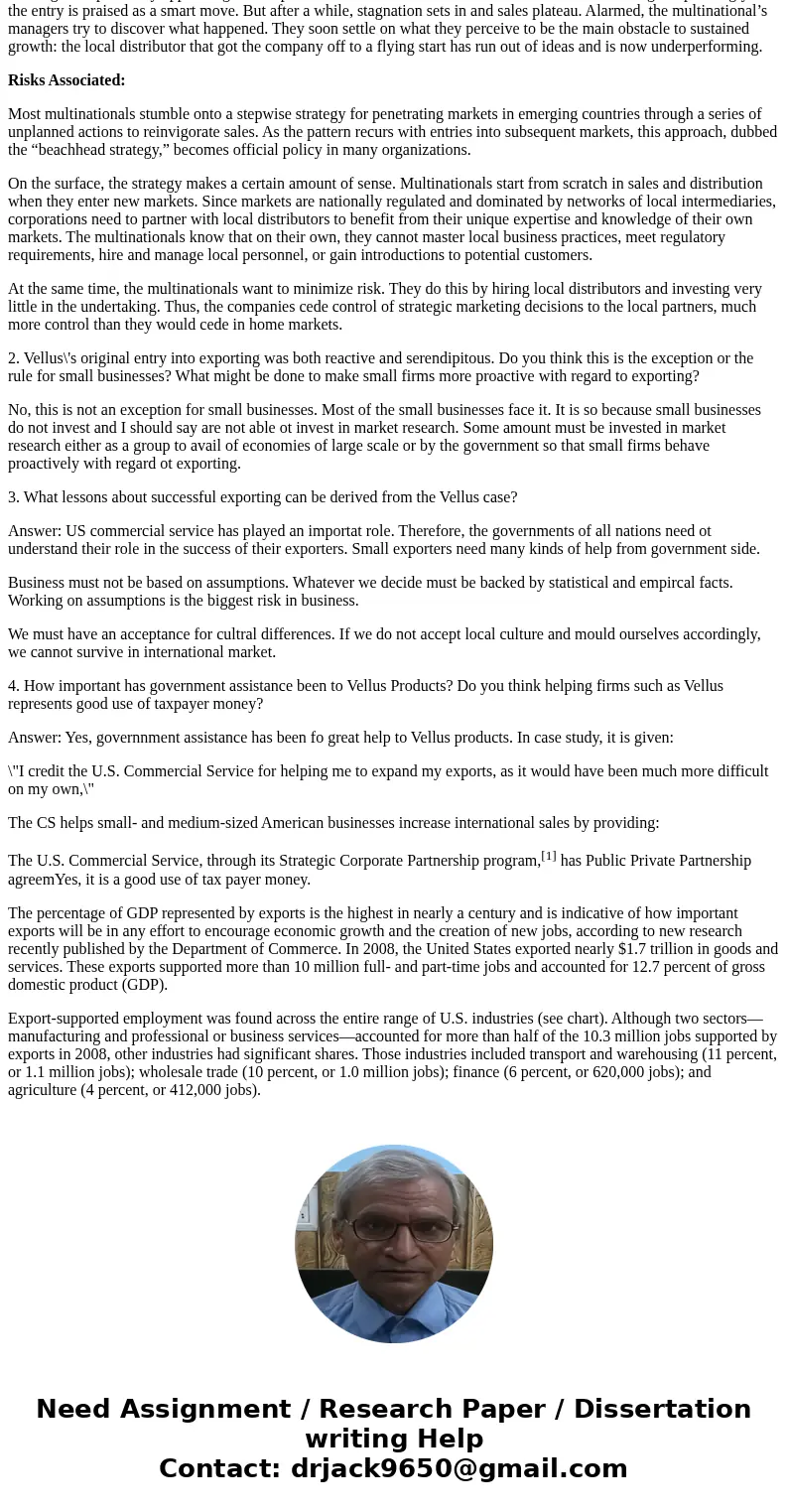Sharon Doherty founded Vellus Products in 1991 in Columbus O
Sharon Doherty founded Vellus Products in 1991 in Columbus, Ohio, to sell pet shampoo. Doherty\'s original insight was that shampoos for people don\'t work well on pets because the skin of most animals is more sensitive than that of humans and becomes easily irritated. As a competitive dog exhibitor, she knew that most existing pet shampoo left dog hair unmanageable and lacking the glamour needed for a dog show. Working with her nephew, who had a Ph.D. in chemistry, Doherty developed salon-type formulas that were specially suited to dogs (shampoo for horses was added later). Doherty booked Vellus\'s first export sales in 1993 when a Taiwanese businessman, who had picked up Vellu\'s shampoo in the United States, ordered $25,000 worth of products he wanted to try to sell through dog shows in Taiwan. Before long, Doherty was getting calls from people around the world-most of whom heard about Vellus products at dog shows-and a thriving export business was born. As the volume of inquiries grew, Doherty realized she needed a better understanding of foreign markets, export potential, and financing options, so she contacted the U.S. Department of Commerce\'s Commercial Service offices in Columbus. \"As business has grown, I have gone from ordering country profiles to requesting customized exporting and financing strategies tailored to maximize export potential,\" she says. Today, Vellus exports to 32 nations, although the bulk of the firm\'s international business operates through distributors in Sweden, Finland, Britain, France, Germany, Australia, New Zealand, Canada, and Iceland, where the products are marketed at pet shows and exhibitions. The company has registered its trademark in 15 European countries, and international sales account for more than half the firm\'s total. \"I credit the U.S. Commercial Service for helping me to expand my exports, as it would have been much more difficult on my own,\"says Doherty. Reflecting on her international success, Doherty has some advice for others who might want to go down the same road. First she says, know whom you are dealing with. Relationships are important to successful exporting. Doherty says she goes out of her way to give advice and guidance to her distributors, sharing her knowledge and helping them to be successful. Second, having been duped by a man who claimed he knew the pet market, when he didn\'t, she advocates doing background checks on potential business partners. \"Gather as much information as you can,\" she says. \"Don\'t make any assumptions; the wrong choice can cost your business valuable time and money.\" Third, Doherty believes that it is important to learn the local culture. Vellus products are adapted to best suit different grooming techniques in different countries, something that she believes has helped to make the company more successful. Finally, Doherty says, enjoy the ride! \"I love exporting because it has enabled me to meet so many people from other cultures. Exporting has made me more broad-minded, and I have developed a great appreciation for other cultures and the way others live their lives.\" Case Discussion Questions 1. Why does Vellus export through local distributors rather than set up its own sales force in country? What are the risks associated with using local distributors? How can these risks be reduced? 2. Vellus\'s original entry into exporting was both reactive and serendipitous. Do you think this is the exception or the rule for small businesses? What might be done to make small firms more proactive with regard to exporting? 3. What lessons about successful exporting can be derived from the Vellus case? 4. How important has government assistance been to Vellus Products? Do you think helping firms such as Vellus represents good use of taxpayer money?
Solution
1. Why does Vellus export through local distributors rather than set up its own sales force in country? What are the risks associated with using local distributors? How can these risks be reduced?
Answer: It is cheaper and easy. Local distributors are better aquainted with the culture of that place and can mould their sales strategy accordingly.
An established corporation looking for new international markets makes a foray into an emerging market, carefully limiting its exposure by appointing an independent local distributor. At first, sales take off, revenues grow pleasingly, and the entry is praised as a smart move. But after a while, stagnation sets in and sales plateau. Alarmed, the multinational’s managers try to discover what happened. They soon settle on what they perceive to be the main obstacle to sustained growth: the local distributor that got the company off to a flying start has run out of ideas and is now underperforming.
Risks Associated:
Most multinationals stumble onto a stepwise strategy for penetrating markets in emerging countries through a series of unplanned actions to reinvigorate sales. As the pattern recurs with entries into subsequent markets, this approach, dubbed the “beachhead strategy,” becomes official policy in many organizations.
On the surface, the strategy makes a certain amount of sense. Multinationals start from scratch in sales and distribution when they enter new markets. Since markets are nationally regulated and dominated by networks of local intermediaries, corporations need to partner with local distributors to benefit from their unique expertise and knowledge of their own markets. The multinationals know that on their own, they cannot master local business practices, meet regulatory requirements, hire and manage local personnel, or gain introductions to potential customers.
At the same time, the multinationals want to minimize risk. They do this by hiring local distributors and investing very little in the undertaking. Thus, the companies cede control of strategic marketing decisions to the local partners, much more control than they would cede in home markets.
2. Vellus\'s original entry into exporting was both reactive and serendipitous. Do you think this is the exception or the rule for small businesses? What might be done to make small firms more proactive with regard to exporting?
No, this is not an exception for small businesses. Most of the small businesses face it. It is so because small businesses do not invest and I should say are not able ot invest in market research. Some amount must be invested in market research either as a group to avail of economies of large scale or by the government so that small firms behave proactively with regard ot exporting.
3. What lessons about successful exporting can be derived from the Vellus case?
Answer: US commercial service has played an importat role. Therefore, the governments of all nations need ot understand their role in the success of their exporters. Small exporters need many kinds of help from government side.
Business must not be based on assumptions. Whatever we decide must be backed by statistical and empircal facts. Working on assumptions is the biggest risk in business.
We must have an acceptance for cultral differences. If we do not accept local culture and mould ourselves accordingly, we cannot survive in international market.
4. How important has government assistance been to Vellus Products? Do you think helping firms such as Vellus represents good use of taxpayer money?
Answer: Yes, governnment assistance has been fo great help to Vellus products. In case study, it is given:
\"I credit the U.S. Commercial Service for helping me to expand my exports, as it would have been much more difficult on my own,\"
The CS helps small- and medium-sized American businesses increase international sales by providing:
The U.S. Commercial Service, through its Strategic Corporate Partnership program,[1] has Public Private Partnership agreemYes, it is a good use of tax payer money.
The percentage of GDP represented by exports is the highest in nearly a century and is indicative of how important exports will be in any effort to encourage economic growth and the creation of new jobs, according to new research recently published by the Department of Commerce. In 2008, the United States exported nearly $1.7 trillion in goods and services. These exports supported more than 10 million full- and part-time jobs and accounted for 12.7 percent of gross domestic product (GDP).
Export-supported employment was found across the entire range of U.S. industries (see chart). Although two sectors—manufacturing and professional or business services—accounted for more than half of the 10.3 million jobs supported by exports in 2008, other industries had significant shares. Those industries included transport and warehousing (11 percent, or 1.1 million jobs); wholesale trade (10 percent, or 1.0 million jobs); finance (6 percent, or 620,000 jobs); and agriculture (4 percent, or 412,000 jobs).


 Homework Sourse
Homework Sourse